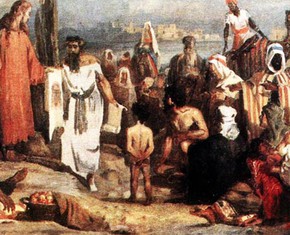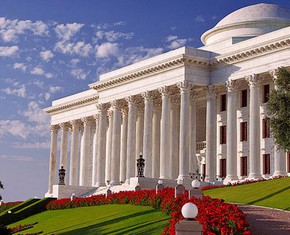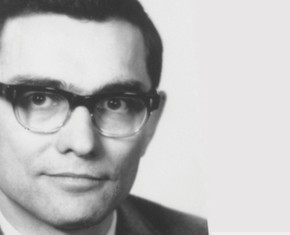The views expressed in our content reflect individual perspectives and do not represent the authoritative views of the Baha'i Faith.
There is a Faith in the world—a religion with millions of enraptured adherents from virtually every region of the globe—that speaks of the oneness of humanity.
But that Faith isn’t just a vague hope. It has bequeathed to its followers an administrative framework to actually help realize this supreme vision—a vision held by every true lover of peace and human progress.
To a casual onlooker, the Baha’i Faith might seem no more than a contemporary religious movement espousing idealistic notions of world peace. But those who choose to explore the breathtaking claims of the central figure of the Baha’i Faith—its founder, Baha’u’llah—and who survey the dramatic and storied history of this newest and second-most-widespread world religion, will find spiritually compelling, practical answers to the most perplexing challenges of this age.
A sincere study of the Baha’i sacred writings—a body of authenticated texts so vast as to fill over 100 books—leaves the open mind filled with a new vision for humanity: a world functioning as a coherent whole and yet richly diverse in its cultural, artistic and nationalistic expressions.
Is the perpetual plight of humanity conflict and instability, given the plenitude of opposing political systems and divergent religious doctrines? The answer would be yes if we conclude that humanity cannot transcend entrenched, conditioned beliefs that no longer serve its progress. Although such transcendence is challenging, history confirms that human beings have the capacity to develop new habits and new ways of being—if they respond to the guidance of new spiritual teachings that illumine the heart and mind and expand the very consciousness we use to understand spiritual truth:
The Revelation of Baha’u’llah, whose supreme mission is none other but the achievement of this organic and spiritual unity of the whole body of nations, should, if we be faithful to its implications, be regarded as signalizing through its advent the coming of age of the entire human race. – Shoghi Effendi, The World Order of Baha’u’llah, p. 163.
What does this new teaching that seeks to bring us together look like? What does it say that has not already been said? What does it ask of us? How can it bring Christian, Muslim, Buddhist, Sikh, Hindu, Jewish, Zoroastrian and other religionists to the table of unity to feast together on new ideals that transcend seemingly intractable differences?
First, it advances the precept that God, the supreme generator and sustainer of all life, has always guided humanity through preordained human instruments—the divine messengers and prophets—who impart divine teachings that promote the welfare of both our spiritual and physical existence. The Baha’i teachings say that the flow of divine guidance—a grace that cannot be fully comprehended—has never ceased; we have never, in any age, been abandoned by the source of our existence. That such divine guidance, necessary for our collective progress, must continue to flow in every age is to every fair-minded observer as evident as the sun shining in the noonday sky.
Second, as spiritual offsprings of the same eternal source, this new set of spiritual teachings encourages us, as members of the human race, to perceive our fundamental oneness—a oneness essential to our existence and fundamentally and irrevocably associated with our progress in both this world and the life hereafter.
The Baha’i writings affirm that we are not powerless subjects of the forces of nature, as are animals, and we are not socially constrained by the painful atrocities and faulty notions of the past. We are capable of changing and embracing a broader vision of who we are—indeed, global progress depends upon our ability to evolve to create new institutions and new systems of interaction for productive collaboration across geographical boundaries.
The drama of history has given us temporal leaders in every age—presidents, priests, kings, chancellors, and prime ministers—but none of these leaders, nor the philosophies of our most erudite thinkers, have galvanized the conscience of humanity sufficiently to knit us into one global family. It is the messengers of God who have come to us successively in every era to reveal a new chapter in God’s unending book of life. These messengers and prophets, one and all, stand above every temporal leader as the true guides of human hearts and as the unerring promoters of God’s divine will for humankind.
As with any written narrative, we do not forget previous chapters when we begin a new one; instead, we recognize that previous chapters provide context and meaning to the new chapter, even as we turn our focus to the chapter at hand.
The Baha’i Faith represents the latest divine chapter in human history.
It opens before every individual a new vista that includes everyone, and that has inspired millions of people around the world, from diverse religious, cultural and ethnic backgrounds, to form loving communities as they embrace an elevated concept of what it means to be human. This concept transcends man-made allegiances and wholeheartedly embraces an expanded vision of humanity that reaffirms our inherent spiritual connection with each other:
Let there be no misgivings as to the animating purpose of the world-wide Law of Baha’u’llah. Far from aiming at the subversion of the existing foundations of society, it seeks to broaden its basis, to remold its institutions in a manner consonant with the needs of an ever-changing world. It can conflict with no legitimate allegiances, nor can it undermine essential loyalties. Its purpose is neither to stifle the flame of a sane and intelligent patriotism in men’s hearts, nor to abolish the system of national autonomy so essential if the evils of excessive centralization are to be avoided. It does not ignore, nor does it attempt to suppress, the diversity of ethnical origins, of climate, of history, of language and tradition, of thought and habit, that differentiate the peoples and nations of the world. It calls for a wider loyalty, for a larger aspiration than any that has animated the human race. It insists upon the subordination of national impulses and interests to the imperative claims of a unified world. – Shoghi Effendi, The World Order of Baha’u’llah, pp. 41-42.
















Comments
Sign in or create an account
Continue with Googleor